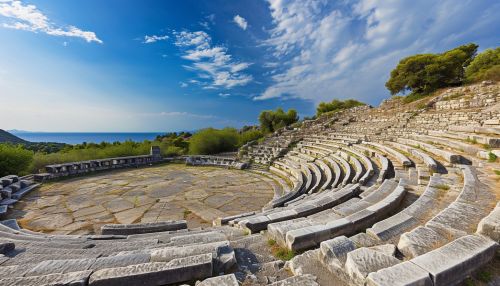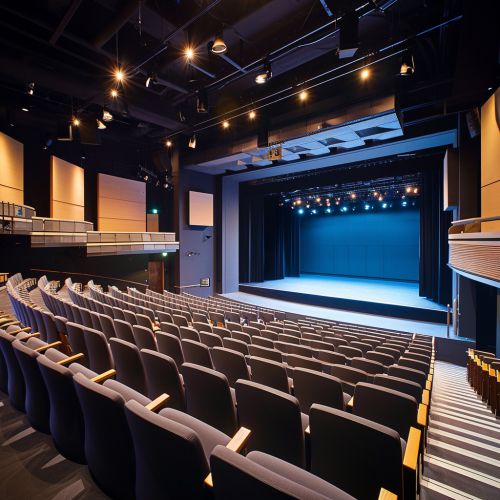Drama
Origins of Drama
Drama, as an art form, has its roots in ancient civilizations. The earliest forms of drama can be traced back to the ancient Greeks, who are often credited with inventing the genre. The term "drama" itself comes from the Greek word "dran," which means "to do" or "to act." Ancient Greek drama was performed in religious festivals and often revolved around mythological themes.


The Greeks developed two distinct forms of drama: tragedy and comedy. Tragedy, the older of the two forms, typically dealt with serious themes and ended in disaster for the main characters. Comedy, on the other hand, was lighter in tone and often ended happily. The works of playwrights such as Aeschylus, Sophocles, and Euripides are still studied and performed today as classic examples of Greek tragedy, while Aristophanes is known for his comedies.
Development of Drama
Drama continued to evolve throughout the centuries, with each era and culture adding its unique contributions. During the Roman Empire, drama became a popular form of entertainment, with plays often performed in large amphitheaters. The Romans are known for their farces and comedies, with playwrights such as Plautus and Terence leaving a lasting legacy.
The Middle Ages saw the rise of morality plays and mystery plays, which were often performed in churches or at religious festivals. These plays were used to teach moral lessons or depict biblical stories. The Renaissance period, particularly in England, was a golden age for drama. Playwrights like William Shakespeare and Christopher Marlowe created works that are still celebrated today for their complex characters, poetic language, and exploration of universal themes.
In the 18th and 19th centuries, melodrama became a popular form of drama. These plays, characterized by exaggerated characters and exciting events, were designed to appeal to the emotions of the audience. The modern era has seen a variety of dramatic styles, from the realism of Henrik Ibsen and Anton Chekhov to the absurdism of Samuel Beckett and Eugène Ionesco.
Elements of Drama
Drama is a complex art form with many elements. These include plot, character, theme, dialogue, music, and spectacle. The plot is the sequence of events in a play, while the characters are the individuals who carry out these events. The theme is the central idea or message of the play, and the dialogue is the words spoken by the characters.


Music and spectacle are also important elements of drama. Music can be used to enhance the mood or atmosphere of a play, while spectacle refers to the visual elements of a production, such as costumes, sets, and lighting. The use of these elements can vary greatly depending on the style of the play and the vision of the director.
Types of Drama
There are many different types of drama, each with its own characteristics and conventions. These include tragedy, comedy, melodrama, farce, and tragicomedy.
Tragedy is a form of drama that deals with serious and often tragic events. The protagonist, or main character, usually undergoes a significant downfall or suffers a tragic fate. Examples of tragedy include Shakespeare's "Hamlet" and Sophocles' "Oedipus Rex."
Comedy is a lighter form of drama that aims to entertain and amuse the audience. Comedies often involve humorous situations and characters, and they usually have a happy ending. Examples of comedy include Aristophanes' "The Birds" and Shakespeare's "A Midsummer Night's Dream."
Melodrama is a dramatic form that emphasizes emotion and sensational action. Melodramas often involve heroes, villains, and damsels in distress, and they typically have a clear distinction between good and evil. Examples of melodrama include the works of playwright Augustin Daly.
Farce is a type of comedy that relies on exaggerated and absurd situations, physical humor, and broad characters. Examples of farce include the plays of Georges Feydeau and the films of Charlie Chaplin.
Tragicomedy is a genre that blends elements of tragedy and comedy. Tragicomedies often involve serious situations that are treated with humor. Examples of tragicomedy include Shakespeare's "The Merchant of Venice" and Chekhov's "The Cherry Orchard."
Drama in Contemporary Times
In contemporary times, drama continues to be a vital and diverse art form. New forms and styles of drama are constantly being explored, and the boundaries of the genre are continually being pushed. Contemporary drama often tackles social and political issues, and it can be a powerful tool for commentary and change.


In addition to traditional theatre, drama can also be found in other forms of media, such as film, television, and radio. These mediums have allowed for new ways of storytelling and have broadened the reach of drama.
See Also
History of Theatre Playwriting Theatrical Production
